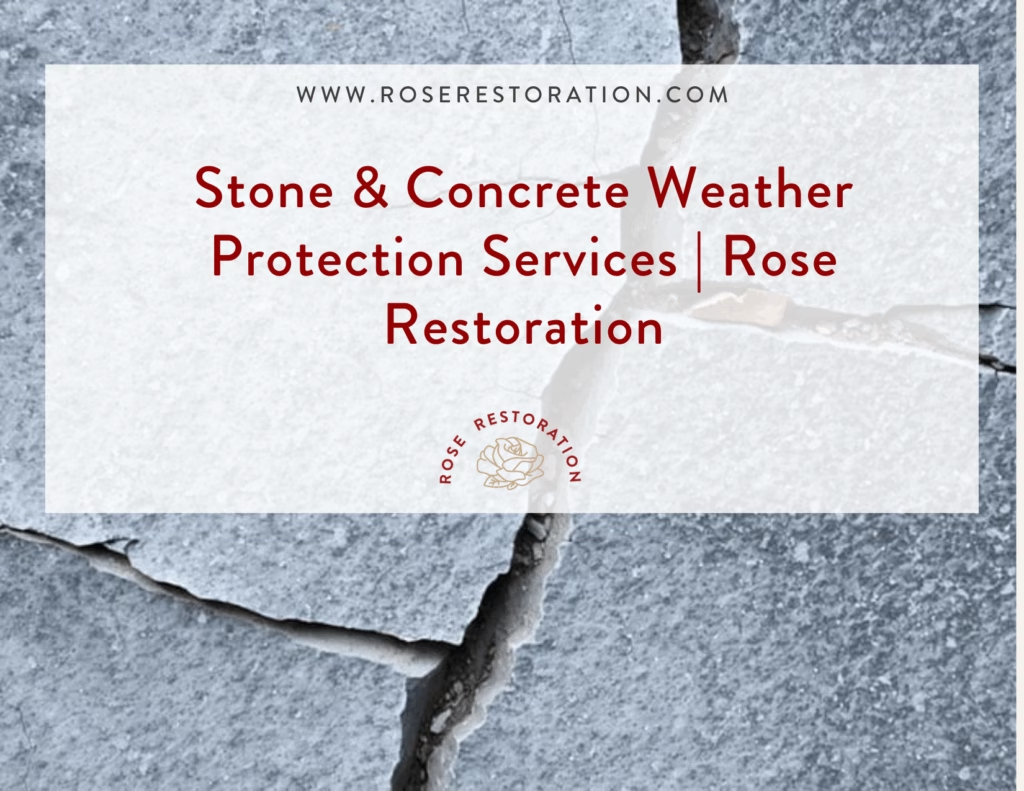Disaster-Proof Your Surfaces: How to Protect Stone & Concrete from Extreme Weather
From scorching summers and heavy rainstorms to harsh winter freezes, extreme weather can wreak havoc on your property’s stone and concrete surfaces. Whether you’re a homeowner with a marble patio or a property manager overseeing concrete walkways, these materials face serious challenges from seasonal temperature swings, water exposure, and de-icing chemicals.
At Rose Restoration, we’ve spent over three decades helping clients across Washington DC, Maryland, and Northern Virginia prepare, protect, and restore their natural stone and concrete installations. Our technicians specialize in preventive maintenance and post-storm restoration, ensuring each surface maintains its beauty and structural integrity year after year.
Why Stone and Concrete Need Special Protection
Natural stone and concrete are incredibly durable, but they are also porous and vulnerable to environmental changes. Moisture, salt, and temperature fluctuations can cause hidden deterioration that worsens over time.
Common weather-related issues include:
Freeze-Thaw Cracking
Water seeps into pores and small fissures. When temperatures drop, it freezes, expands, and widens the cracks. Repeated cycles can lead to chipping, flaking, or loose tiles—especially in exterior patios and steps.
Salt and Chemical Etching
De-icing salts and chemical snow melts can stain and corrode natural stone like marble, limestone, and travertine. Even concrete surfaces can weaken and spall when exposed repeatedly.
Heat Expansion and UV Damage
Intense summer heat causes stone and concrete to expand, creating surface tension and hairline cracks. Direct sunlight can fade color and create uneven tones, particularly on slate or travertine.
Water Intrusion
Heavy rain or flooding saturates unsealed materials, leading to efflorescence, mold, or mineral deposits that damage both the surface and substructure.
How to Prepare Before Extreme Weather
The best defense is proactive maintenance. Preparing your stone and concrete before the season changes can prevent expensive repairs later.
Seal Your Surfaces
Sealing provides a protective barrier that resists water, oil, and salt intrusion. This service is essential for marble patios, limestone pool decks, granite steps, and exposed concrete walkways. Homeowners across the DC area typically benefit from resealing every 12 to 18 months, ideally before winter or heavy rain seasons.
Inspect for Cracks and Chips
Minor cracks in concrete or natural stone allow water to penetrate beneath the surface. Rose Restoration offers epoxy crack repair and chip restoration for marble, granite, terrazzo, and outdoor concrete. These small fixes prevent much larger issues during freeze-thaw cycles.
Choose Safe De-Icers
Avoid rock salt, which corrodes both stone and concrete. Instead, use calcium magnesium acetate (CMA) or similar stone-safe products. Mats near entryways help minimize salt tracking indoors.
Maintain Drainage Systems
Standing water is one of the biggest threats to stone longevity. Ensure gutters, downspouts, and drains are free of debris. Proper water flow helps prevent staining, erosion, and surface breakdown.
During the Storm
When severe weather hits, prioritize safety. However, a few simple steps can help reduce long-term damage:
Place mats or rugs in entryways to trap salt and water.
Use non-corrosive de-icers to prevent slip hazards.
Mark icy areas near walkways or steps to reduce accidents.
After the Storm
The first few days following a major storm are critical for surface recovery.
Clean Thoroughly
Use pH-neutral stone cleaners to remove salt residue, dirt, and debris. Avoid harsh chemicals that may etch or discolor surfaces.
Inspect for Hidden Damage
Look for hairline cracks, fading, or powdery residue—signs of moisture intrusion or salt reaction. Rose Restoration offers detailed post-weather inspections to assess and address hidden vulnerabilities.
Schedule Professional Repairs
Don’t delay needed restoration. Our team provides marble polishing, concrete crack repair, terrazzo restoration, and sealing to correct storm-related damage. Early intervention extends the life of your surfaces and prevents escalating costs.
Materials That Stand Up to Harsh Climates
Some materials perform better than others in challenging Mid-Atlantic weather. When selecting or replacing surfaces, consider:
| Material | Weather Resistance | Ideal Use |
|---|---|---|
| Granite | Excellent, withstands freeze-thaw cycles | Exterior steps, patios, pool surrounds |
| Polished Concrete | Exceptional durability and low maintenance | Retail floors, garages, walkways |
| Epoxy-Coated Concrete | Superior chemical resistance | Commercial kitchens, industrial spaces |
| Travertine | Moderate, requires sealing | Interior floors, spas, covered patios |
Even the most resilient materials still need annual maintenance to remain protected from the elements.
Seasonal Maintenance Checklist
Fall/Winter Preparation
Reseal stone and concrete before freezing temperatures.
Repair cracks or chips in exterior hardscapes.
Apply anti-slip coatings to outdoor walkways.
Stock up on stone-safe de-icing materials.
Spring/Summer Maintenance
Remove salt residue and inspect for winter damage.
Schedule stone polishing or deep cleaning for interior floors.
Reseal outdoor surfaces before heavy rain or extreme heat.
Why Choose Rose Restoration
With over 30 years of experience, Rose Restoration has become a trusted partner for homeowners and commercial property managers across Washington DC, Maryland, and Northern Virginia. Our services include:
Stone and concrete sealing and waterproofing
Crack and chip repair with industrial-grade epoxy
Marble, granite, and terrazzo restoration
Preventive maintenance and post-storm cleaning
Environmentally safe products for lasting protection
Our local expertise and understanding of Mid-Atlantic climate challenges allow us to create maintenance plans that keep your property beautiful and weather-resistant all year long.
Protect Your Surfaces Before the Next Storm
Preventive care is always more affordable than repair. By taking a few simple steps now—sealing, inspecting, and cleaning—you can protect your home or property from costly damage caused by extreme weather.
Contact Rose Restoration today to schedule a consultation or seasonal maintenance service. Our specialists will help you disaster-proof your stone and concrete surfaces for years of lasting strength and beauty.


